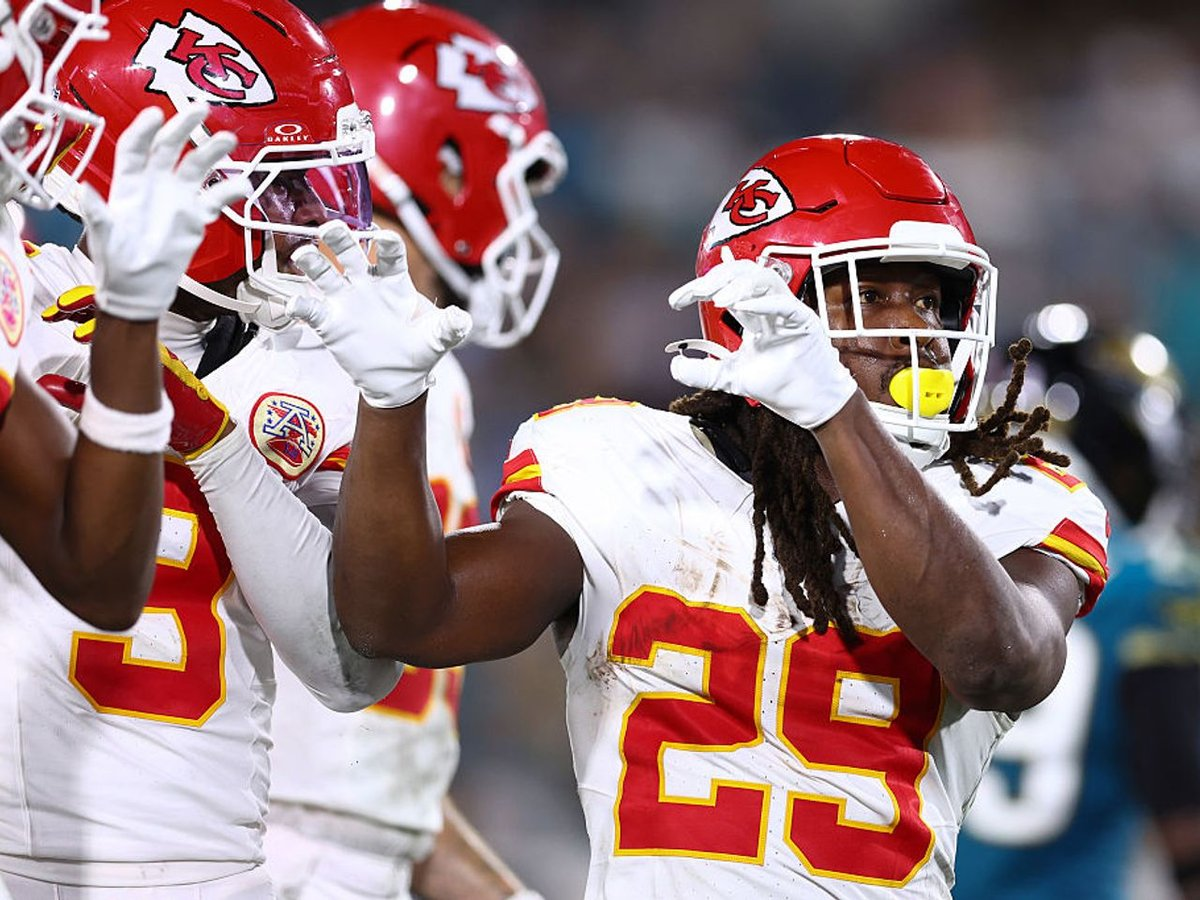In the electric atmosphere of an NFL showdown, the Jacksonville Jaguars have just snatched a 24-21 advantage over the Kansas City Chiefs with a pivotal field goal, an outcome that reflects both the unpredictable nature of football and the evolving narratives within the league. This game, unfolding with the intensity and drama befitting two teams with high stakes, offers a fascinating case study in momentum shifts, strategic gambits, and the ever-present tension between offense and defense. The Jaguars, often cast as underdogs in encounters with the Chiefs’ high-octane offense, have demonstrated a resilience that speaks volumes about their growth and the nuanced coaching philosophies shaping their identity.
Jacksonville’s recent field goal, a measured yet decisive strike, encapsulates the delicate balance of risk and reward in NFL play-calling. Unlike the Chiefs, who often favor explosive plays and aggressive downfield attacks, the Jaguars have leaned into a more methodical approach, capitalizing on sustained drives and defensive stops. This FG not only extends their lead but also signals a moment where patience and precision have trumped the Chiefs’ flair and improvisation. Watching this game unfold, one is reminded of the broader strategic battles that define professional football — a chess match played at breakneck speed, where every yard gained or lost can ripple through the psyche of players and fans alike.

The Chiefs, led by one of the most dynamic quarterbacks of the modern era, have been a formidable force in recent years, their offense a blend of creativity and power. Yet, tonight, the Jaguars’ defense has displayed an adaptability that counters Kansas City’s usual dominance. This pushback is emblematic of the shifting landscape within the NFL, where teams like Jacksonville are no longer content to simply react but are actively reshaping how the game is contested. Their success in this contest, underscored by the pivotal field goal, invites a reevaluation of assumptions about team hierarchies and the trajectories of franchises traditionally viewed as rebuilding or transitional.
For fans and analysts, this matchup offers more than just a scoreline; it is a lens through which to examine the evolving nature of competition in the league. The Jaguars’ ability to take and maintain a lead against a powerhouse like the Chiefs speaks to broader themes of resilience, innovation, and the democratization of talent across the NFL.

Historically, the Chiefs have been associated with a relentless offensive tempo, a trait that has both thrilled spectators and often overwhelmed opponents. The Jaguars’ recent performance, however, suggests a growing maturity in their game plan, one that involves disrupting rhythm and exploiting moments of vulnerability. This field goal, scored under pressure, is emblematic of this strategic evolution. It also highlights the importance of special teams in close contests—an often underappreciated facet of football that can decisively tilt momentum, as explored by experts in sports analytics and commentary such as those featured in The New York Times.
As the game progresses, the narrative remains fluid. Will the Chiefs respond with their characteristic offensive bursts, or will the Jaguars continue to assert control through disciplined execution? The answer will likely hinge on adjustments made in the coming quarters, reflecting the adaptability and mental toughness that define championship-caliber teams. This contest, therefore, is more than a snapshot of a single game; it is a microcosm of the NFL’s ongoing evolution, where established powers face emerging challengers in battles that captivate millions.
For those interested in the broader implications of this game and others like it, our story offers a detailed exploration of how such matchups influence league dynamics and fan engagement alike.

Reflecting on this moment in the Chiefs vs. Jaguars game, one is reminded of the timeless allure of sports: the uncertainty, the drama, and the human stories that unfold with every play. As Jacksonville takes a slender lead, the contest remains wide open, a testament to the unpredictable beauty of football. Whether this game becomes a defining chapter in either franchise’s history or simply a thrilling encounter in a long season, it underscores the enduring power of competition to inspire, challenge, and unite.
Sources and further reading:
- NFL Official Site
- Jacksonville Jaguars Wikipedia
- Kansas City Chiefs Wikipedia
- The New York Times live updates
In the end, this game is a vivid reminder that in sports, as in life, the margins between victory and defeat are often razor-thin, shaped by moments of brilliance and resolve. As the clock winds down, all eyes remain fixed on the field, where the story continues to write itself in real time.
As the Jaguars seize a 24-21 lead with that critical field goal, the atmosphere in the stadium shifts palpably. The crowd, a sea of contrasting colors and emotions, reflects the high stakes of this encounter. In moments like these, the psychological battle becomes as intense as the physical one; the Chiefs, known for their resilience and late-game heroics, must now grapple with the pressure of overcoming a deficit against a Jaguars team that has steadily grown in confidence throughout the night. Patrick Mahomes, whose playmaking prowess has often been the difference-maker in tight games, faces a defense that has tightened its grip, forcing him to recalibrate and dig deep into his arsenal of throws and audibles. Meanwhile, the Jaguars’ offense, led by Trevor Lawrence, demonstrates a balance of patience and aggression, mixing runs and passes to keep the Chiefs’ defense guessing. This delicate chess match on the gridiron underscores the evolving strategies that define modern NFL play, where adaptability and composure under pressure often tip the scales.

The significance of this game extends beyond the scoreboard. For Jacksonville, a franchise still carving out its identity in the league, moments like these are pivotal in building a culture of belief and competitiveness. Their ability to challenge a perennial powerhouse like Kansas City signals a shift in the NFL landscape, emphasizing parity and the rise of new contenders. Conversely, for the Chiefs, who have been a dominant force over the past decade, this game serves as a reminder that no dynasty remains unchallenged indefinitely. The ebb and flow of success in professional sports are cyclical, and tonight’s contest may well be a bellwether for the next phase in both teams’ trajectories. As fans witness this gripping duel, they are also witnessing the unfolding narrative of two franchises at distinct crossroads, each striving to write their next chapter.
Turning to the broader implications, this clash resonates with the ongoing evolution of football itself. The emphasis on versatile quarterbacks, dynamic offensive schemes, and strategic defensive adjustments reflects a sport in constant flux, propelled by innovation and the relentless pursuit of excellence. Analysts and enthusiasts alike will pore over each play, dissecting decisions and execution, while coaches and players absorb lessons that will inform future encounters. The ripple effects extend into drafting strategies, training methodologies, and even fan engagement, illustrating how a single game can influence the sport’s ecosystem. As the final minutes tick away, the tension is not just about who wins or loses, but about the stories this game will tell for years to come—stories of perseverance, strategy, and the unyielding human spirit that makes football more than just a game.
As the clock winds down in this tightly contested battle, the Jaguars’ 24-21 lead after that crucial field goal has injected a palpable sense of urgency into the Chiefs’ sideline. Patrick Mahomes, known for his composure under pressure, now finds himself navigating a defense that has grown increasingly disciplined and opportunistic throughout the evening. The Jaguars, under the steady leadership of their coaching staff, have demonstrated a remarkable ability to adapt mid-game, shifting defensive coverages and leveraging their pass rush to disrupt the rhythm of Kansas City’s normally fluid offense. This adaptability is emblematic of a franchise that has embraced a new identity—one that balances youthful exuberance with strategic savvy, signaling that Jacksonville is no longer content to merely participate but aims to assert itself as a perennial threat.
Kansas City’s response to this mounting pressure will be telling, not just for the outcome of this game but for what it reveals about the team’s resilience and tactical depth. The Chiefs have long been lauded for their explosive offensive arsenal, yet tonight has exposed some vulnerabilities—moments where communication faltered or where the defensive unit failed to contain a critical third-down conversion. These instances serve as a reminder that even the most seasoned teams must continually evolve to maintain their edge. With the weight of expectations heavy on their shoulders, Mahomes and his teammates must harness their collective experience and championship pedigree to orchestrate a comeback that feels both urgent and meticulously crafted.
Meanwhile, the Jaguars’ sideline buzzes with cautious optimism. The field goal that pushed them ahead wasn’t just points on the board; it was a statement of intent. It underscored their capacity to capitalize on opportunities, maintain composure in high-stakes scenarios, and execute under pressure. The crowd, both in the stadium and watching across the nation, senses the birth of a new rivalry—a clash not merely of teams but of contrasting philosophies and eras. This game encapsulates the shifting dynamics within the NFL, where emerging teams challenge established hierarchies, and the margins between victory and defeat are razor-thin.
As the final drives unfold, the strategic chess match between the coaching staffs becomes increasingly pronounced. Will the Jaguars play conservatively, leaning on their defense to preserve the lead, or will they seek to extend it with aggressive play-calling? Conversely, will the Chiefs rely on Mahomes’ improvisational brilliance, or will they attempt to methodically dismantle Jacksonville’s defensive schemes through calculated precision? These decisions, made in real-time and under immense pressure, will resonate far beyond the final whistle. They will influence offseason evaluations, player development trajectories, and the broader narrative arcs that define each franchise’s identity.
In many ways, this game is a microcosm of the NFL’s broader evolution. The balance between old guard and new blood, between established legacies and emerging ambitions, is playing out not just on the field but in the hearts of fans and analysts alike. As the Jaguars cling to their narrow lead and the Chiefs mount their final assault, the drama transcends the scoreboard. It is a testament to the enduring allure of football—a sport where every snap carries the weight of history, every yard gained or lost tells a story, and where the pursuit of greatness is an unending journey marked by moments of brilliance, heartbreak, and redemption.

As the seconds tick away, the narrative is still being written. Whether this contest concludes with a thrilling comeback or a historic upset, the implications ripple across the league. For the Jaguars, it is validation of their ascent and a harbinger of the battles yet to come. For the Chiefs, it is a call to recalibrate and reassert their dominance in a league that never stands still. This game, in all its tension and complexity, reminds us why we watch, why we care, and why football remains one of the most compelling dramas in sports today.
The Jaguars’ decision to lean on their special teams in that crucial moment, opting for a field goal rather than risking a costly turnover, underscores the strategic chess match unfolding beneath the surface of this gridiron battle. It’s a reminder that the NFL is as much about calculated patience as it is about explosive athleticism. The 24-21 lead they now hold is precarious, a slender thread holding back the tide of Kansas City’s relentless offense. Patrick Mahomes, with his trademark poise and improvisational genius, has been probing the Jaguars’ secondary with a mix of precise throws and daring scrambles, refusing to let the momentum slip away. Yet, Jacksonville’s defense, spirited and opportunistic, has shown a resilience that belies their underdog status, turning what could have been a rout into a nail-biting contest.
This game also serves as a fascinating lens through which to examine the evolving identities of these franchises. The Chiefs, long celebrated for their high-octane offense and Mahomes’ transcendent talents, are now being tested in a way that challenges their narrative of inevitability. Meanwhile, the Jaguars, who have endured years of rebuilding and uncertainty, are crafting a new story—one defined by grit, strategic acumen, and the emergence of young stars eager to leave their mark. The ripple effects of this matchup will be felt beyond the final whistle, influencing draft boards, front office decisions, and even the psychological landscapes of players and coaches alike.

Looking ahead, the closing minutes promise a crescendo of tension and tactical ingenuity. The Chiefs’ offense, known for its ability to orchestrate late-game heroics, will need to navigate a defense that has tightened its grip just when it mattered most. Meanwhile, the Jaguars must balance aggression with caution, knowing that a single misstep could unravel their hard-fought advantage. This duel, rich with subplots and stakes, encapsulates the essence of playoff football—where legacies are forged not just in victory, but in the unwavering will to compete against the odds. As the clock winds down, the story remains unwritten, a testament to the enduring magic that only the NFL can conjure.
As the third quarter gave way to the final stanza, the palpable energy in the stadium shifted—an electric blend of hope, anxiety, and raw competitive spirit. Patrick Mahomes, ever the maestro, took the field with that trademark calm intensity, his eyes scanning the defense for any hint of vulnerability. Yet, the Jaguars’ secondary, emboldened by recent successes, tightened their coverage, forcing the Chiefs into a series of quick decisions and contested throws. It was a chess match writ large on the gridiron, each side probing for weaknesses, adjusting schemes in real time. The Jaguars’ defensive coordinator, known for his innovative blitz packages, dialed up pressure that unsettled Mahomes momentarily, a rare sight given the quarterback’s usual poise under duress. This pressure culminated in a crucial third-down incompletion, forcing the Chiefs to punt and ceding momentum back to Jacksonville.
The Jaguars, seizing the opportunity, methodically marched down the field with a blend of power runs and timely passes. Trevor Lawrence, whose development from promising rookie to emerging star has been one of the NFL’s most compelling narratives, showcased a maturity beyond his years. His ability to read the field, paired with a calm pocket presence, allowed Jacksonville to exploit subtle mismatches. On a pivotal third-and-long, Lawrence connected with Christian Kirk on a sideline route that not only converted the first down but also ignited the crowd into a frenzy. This drive culminated in a field goal that nudged the Jaguars ahead, 24-21, a scoreline that reflected not just the points but the psychological edge gained.

The Chiefs’ sideline was a mixture of urgency and strategic recalibration. Andy Reid, one of the most experienced coaches in the league, was seen conferring intensely with his offensive coordinator, plotting a response that would both challenge the Jaguars’ defensive adjustments and rekindle his team’s offensive rhythm. The tension was thick; the stakes could not be higher. For all their offensive firepower, the Chiefs had been slowed, their usual rhythm disrupted by a Jaguars defense that refused to yield. This contest, far from a foregone conclusion, was evolving into a true test of resilience and adaptability on both sides.
Beyond the immediate drama, the implications of this game stretch into the broader NFL landscape. A victory for the Jaguars would solidify their status as legitimate contenders, a validation of years of patient rebuilding and smart drafting. For the Chiefs, a loss would raise questions about the sustainability of their dynasty and the adjustments necessary to maintain their elite status in a league that is perpetually evolving. As the final minutes tick away, the narrative threads intertwine—legacy, ambition, and the relentless pursuit of greatness—reminding us why football remains one of the most enthralling spectacles in sports today.




